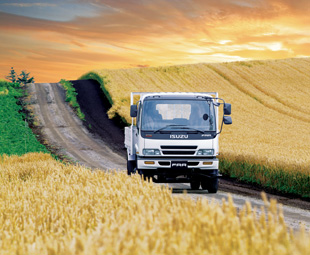A collection of firsts

When Isuzu Truck South Africa began operations locally on 1 January 2007, the manufacturer had only one goal in mind: to be the best. Since taking this decision, it has proved that in the very near future it might achieve just that.
“Isuzu trucks were not new to the market when we joined the field in 2007,” points out Craig Uren, chief operations officer at Isuzu Truck SA. “The brand was already known and respected, but lacking the firm product, sales and service support of the manufacturer actually being based in South Africa.”
The creation of Isuzu Truck SA (Isuzu Truck), a 50/50 partnership between Isuzu Motors Limited Japan and General Motors South Africa (GMSA), marked the Japanese manufacturer’s official entry into the local market, however, at which point the company began its aggressive campaign to woo South African truckers.
“Isuzu Motors is number one in over 25 countries around the world,” explains Uren. “We have an excellent, affordable product, and an excellent support system to back it up. We certainly don’t believe we are setting our sights too high.”
The manufacturer’s growth over the past three years certainly supports Uren’s optimism. “We enjoyed a 10% growth in market share in our first year of operation, 15% growth in our second year, and year-to-date we are already in excess of 20% growth in market share, and in a tough market too. We are certainly satisfied with how Isuzu Truck is performing, and the reception we are receiving from the local market.”
This reception can largely be attributed to Isuzu Truck’s way of doing business. The depressed local market has not caused the manufacturer to go into hiding, but rather face the challenges head on, while continuing to offer unique products and concentrate heavily on after-sales service.
Keeping trucks on the road
In early 2009, Isuzu Truck announced that it would not be cutting back expenditure in response to the looming economic recession. Instead, it guaranteed its full support to customers as they faced a difficult fiscal year.
“One of the bonuses of a financially sound company is its ability to continue investing in its customers, products and infrastructure, even during trying times,” says Uren.
To date, Isuzu Truck has invested
R350 million in upgrading its facilities, training, tooling and parts. According to Jayesh Daya, service administration manager, the company’s core focus throughout 2009 has been on ensuring that Isuzu truck dealers across the country have been adequately equipped to provide the best possible service and support to Isuzu truck customers.
“Equipping the dealers to excel in after-sales support not only sustains operators, but gives dealers additional revenue while truck sales are slow,” Daya explains.
“A truck is essentially a business unit: it needs to be efficient and reliable. Strong after-sales support ensures minimum downtime, both through timely and professional servicing, and a 24-hour roadside assistance programme.”
According to Uren, it is Isuzu Truck’s firm belief that operators are not willing to take a risk on no-name brands, particularly in current economic circumstances. However, while this ideal does shape the company’s drive towards ensuring its customers of strong original equipment manufacture support, it is not the current economic climate that has led to the creation of a strong after-sales strategy.
“Since our entry into the South African market we have given a 95% guarantee on parts availability, with a strong focus on sales and after-sales support,” he says, quipping that Isuzu Truck prides itself on being an after-sales franchise that happens to sell trucks, although the awards the company amassed during its brief two years in the market is heartening confirmation.
Winner of the 2007 Focus on Excellence Award for Vehicle Distributor with the Best Sales Support and nominated for Vehicle Distributor with the Best Parts Support after only one year in existence, the company went on to win the 2008 Focus on Excellence Award for Vehicle Distributor with the Best Sales Support as well.
Its 2009 nominations are extensive. Best Medium Commercial Vehicle and Best Heavy Commercial Vehicle give the nod to the manufacturer’s product range, but it is the realm of sales and after-sales support that Isuzu Truck really shows its mettle. Best Truck Supplier, Vehicle Distributor with the Best Sales Support, Vehicle Distributor with the Best Service Support, and Vehicle Distributor with the Best Parts Support bring the manufacturer up to six nominations this year.
“While we are hardly in the business to win awards, nominations such as these are a nod to the entire Isuzu Truck staff value chain, from head office to the various dealerships and service centres,” says Uren.
“The fundamentals of successful parts, service, sales and training departments, are that nothing is isolated. Everyone is in essence working together to create a great overall experience of our product.”
A product first
After-sales service is not the manufacturer’s only focus, however, albeit a big one. Isuzu Truck’s automated manual transmission (AMT) range of medium commercial vehicles (MCVs) is not only a South African first, but a world first, revolutionising the line between automatic and manual gearboxes, offering the best of both systems.
Simply stated, AMT is a manual gearbox that operates without a clutch and is controlled by an onboard computer. From the driver’s perspective, it behaves like an automatic gearbox, which means that an AMT truck is far easier to operate, requiring less training and driving skill.
Because it is still essentially a manual rather than automatic gearbox, however, its purchase price is more cost effective than an automatic truck. It is here that an operator first benefits through this product.
“Our AMT ‘Smoother’ transmission system promises to make a substantial difference to what operators can expect from their vehicles, drivers and ultimately budgets,” explains Anton du Plessis, Isuzu Truck SA’s product planning and engineering manager.
“Two of the biggest challenges currently facing operators are a severe lack of skilled drivers and the threat of downtime – a situation often caused by poor driving. The AMT range is a solution to both. It’s our answer to many of our clients’ biggest bottom-line threats.
“For an initial extra outlay of R10 000, an operator can buy an AMT model instead of a manual transmission truck,” continues Du Plessis. “This investment is recouped by the end of the first year when the operator does not need to replace the clutch, because there isn’t one.
“Clutches last an average of between 70 000 and 100 000 km. So over the course of a vehicle’s life, the clutch will need to be replaced five times. Over a fleet of vehicles this becomes a substantial cost.”
Commercial transport is a time-based, highly competitive industry and downtime can be detrimental to an operator with delivery deadlines to meet. How a vehicle is driven plays a major role in the maintenance, lifespan and overall efficiency of that vehicle.
“A poorly driven vehicle will experience more frequent breakdowns and maintenance issues than a well-driven vehicle,” says Du Plessis. “Similarly, a well-treated engine will have a longer lifespan and will naturally be more fuel efficient.”
Isuzu Truck has its eye on being a leader in South Africa’s truck market. Given that it is combining the correct products with effective sales and after-sales service, the manufacturer is certainly worth watching in the future.
Published by
Focus on Transport
focusmagsa




